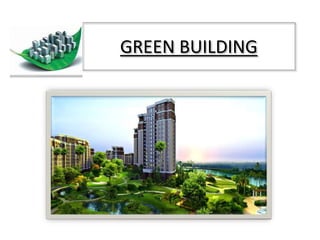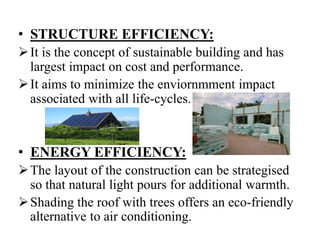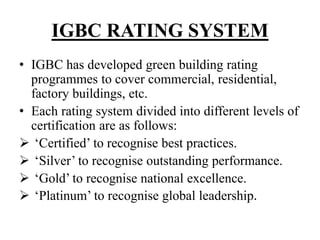Greenbuildings 140121064151-phpapp02
- 2. "A green building is one which uses less water, optimises energy efficiency, conserves natural resources, generates less waste and provides healthier spaces for occupants, as compared to a conventional building.ŌĆØ INTRODUCTION
- 3. OBJECTIVES OF GREEN BUILDING ŌĆó Green Buildings are designed to reduce the overall impact on human health and the natural environment by the following ways: ŌĆó Using energy, water and other resources efficiently ŌĆó By reducing waste, pollution, and environmental degradation.
- 4. FUNDAMENTAL PRINCIPLES ŌĆó Structure design efficiency ŌĆó Energy efficiency ŌĆó Water efficiency ŌĆó Materials efficiency ŌĆó Waste and toxic reduction
- 5. ŌĆó STRUCTURE EFFICIENCY: ’āśIt is the concept of sustainable building and has largest impact on cost and performance. ’āśIt aims to minimize the enviornmment impact associated with all life-cycles. ŌĆó ENERGY EFFICIENCY: ’āśThe layout of the construction can be strategised so that natural light pours for additional warmth. ’āśShading the roof with trees offers an eco-friendly alternative to air conditioning.
- 6. ŌĆó WATER EFFICIENCY: ’āśTo minimize water consumption one should aim to use the water which has been collected, used, purified and reused.
- 7. ŌĆó MATERIAL EFFICIENCY: ’āśMaterials should be use that can be recycled and can generate surplus amount of energy. ’āśAn example of this are solar power panels,not only they provide lightening but they are also a useful energy source. ŌĆó WASTE AND REDUCTION: ’āśIt is probable to reuse resources. ’āśWhat may be waste to us may have another benefit to something else by ŌĆś3RŌĆÖS.ŌĆÖ
- 8. INDIAN GREEN BUILDING COUNCIL ŌĆó The Indian Green Building Council (IGBC) was formed in the year 2001 by Confederation of Indian Industry (CII). ŌĆó The aim of the council is to bring green building movement in India and facilitate India to become one of the global leaders in green buildings by 2020.
- 9. IGBC RATING SYSTEM ŌĆó IGBC has developed green building rating programmes to cover commercial, residential, factory buildings, etc. ŌĆó Each rating system divided into different levels of certification are as follows: ’āś ŌĆśCertifiedŌĆÖ to recognise best practices. ’āś ŌĆśSilverŌĆÖ to recognise outstanding performance. ’āś ŌĆśGoldŌĆÖ to recognise national excellence. ’āś ŌĆśPlatinumŌĆÖ to recognise global leadership.
- 10. GREEN BUILDINGS PROJECT IN INDIA ŌĆó Suzlon Energy Limited-Pune ŌĆó Biodiversity Conservation India-Bangalore ŌĆó Olympia Technology Park-Chennai ŌĆó ITC Green Centre-Gurgaon ŌĆó The Druk White Lotus School-Ladakh ŌĆó Doon School-Dehradun ŌĆó Raintree Hotels-Chennai ŌĆó Nokia-Gurgaon ŌĆó Rajiv Gandhi International Airport-Hyderabad ŌĆó Hiranandini-BG House, Powai ŌĆó ABN Amro Bank, Chennai ŌĆó Palais Royale at Worli, Mumbai ŌĆó Punjab Forest Complex,Mohali
- 11. ŌĆó SUZLON ENERGY LIMITED,PUNE: ’āś Several accolades continue to shower upon SuzlonŌĆÖs global headquarter in Pune ŌĆ£One EarthŌĆØ. ’āś LEED certified it as ŌĆśPLATINUMŌĆÖ and it is built on an area of 10.13acres. ’āś One Earth can be counted as among the largest green building projects in India.
- 12. ŌĆó RAJIV GANDHI INTERNATIONAL AIRPORT-HYDERABAD: ’āś IndiaŌĆÖs first Greenfield airport is undeniably among the top 10 green buildings in India. ’āś First airport in asia to be certified with ŌĆśSILVERŌĆÖ rating. ’āś This green building ensures optimal use of natural light and minimal wastage of electricity or energy consumption.
- 13. ŌĆó NOKIA-GURGAON: ’āś ŌĆśGOLDŌĆÖ rated building by LEED(Leadership in Energy & Environmental Design). ’āś Its smart lighting, heat recovery wheel and high efficiency chillers makes this office stand out from the rest.
- 14. SOME IMAGES OF GREEN BUILDINGS
- 15. DIFFERENT FROM OTHER BUILDINGS ŌĆó The design,maintaince and construction of buildings have tremendous effect on our enviornment and natural resources. BUT: ŌĆó Green Building is different from the other buildings because it use a minimum amount of nonrenewable energy, produce minimal pollution, increases the comfort, health and safety of the people who work in them. ŌĆó It also minimize the waste in construction by recovering materials and reusing or recycling them.
- 16. INCREASING GREEN BUILDINGS IN INDIA ŌĆó Today more than 80153 green buildings (as on April 2011) are being constructed all over India, of which 3347 green buildings are certified and fully functional.
- 17. BENEFITS OF GREEN BUILDING ŌĆó Buildings have a large effect on the enviornment,human health and the economy. ŌĆó The successful adoption of GREEN BUILDING development can maximize both the economic and enviornmental performance of the buildings.
- 18. ENVIORNMENTAL BENEFITS ŌĆó Protect biodiversity and ecosystems ŌĆó Improve air and water quality ŌĆó Reduce waste streams ŌĆó Conserve natural resources
- 19. ECONOMIC BENEFITS ŌĆó Reduce operating costs ŌĆó Create, expand, and shape markets for green product and services ŌĆó Improve occupant productivity
- 20. SOCIAL BENEFITS ŌĆó Enhance occupant comfort and health. ŌĆó Heighten aesthetic qualities. ŌĆó Minimize strain on local infrastructure. ŌĆó Improve overall quality of life.
- 22. AFFECT ON NATURAL RESOURCES ŌĆó According to surveys conducted in 2013, 977.3 million acres of total land area is developed, which represents an increase of 44 percent land covering green buildings over the past 3 years. ŌĆó In terms of energy, buildings accounted for 39.4 percent of total energy consumption and 67.9 percent of total electricity consumption.
- 23. CONCLUSION ŌĆó This research identified the exciting developments taking place on the technology front and analyzes their implications for intelligent and green buildings, highlighting examples of ŌĆ£best in classŌĆØ buildings employing green and intelligent technologies. These buildings are dynamic environments that respond to their occupantsŌĆÖ changing needs and lifestyles. This research provided documented evidence to educate and influence end-users, building owners, architects, and contractors that a ŌĆ£greener buildingŌĆØ can be achieved using intelligent technology and that this ŌĆ£greeningŌĆØ will provide a tangible and significant return on investment.
- 24. REFRENCES ŌĆó http://www.igbc.in/site/igbc/tests.jsp?event=22869 ŌĆó http://www.greenbuildingsindia.com/Green- Buildings.html ŌĆó http://www.biperusa.org/6-objectives-of-green- building.html ŌĆó http://www.brighthub.com/environment/green- living/articles/51601.aspx ŌĆó http://ecenter.colorado.edu/greening-cu/green- building ŌĆó http://www.chillibreeze.com/articles/top-10-green- buildings-in-India-1011.asp ŌĆó http://gbindia.wordpress.com/igbc-rating-system-2/

























